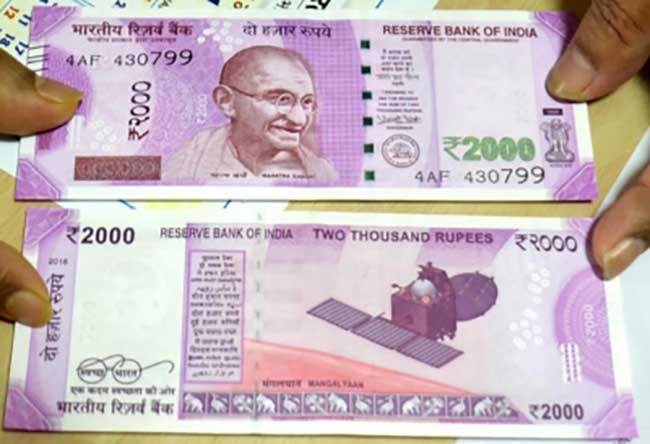The Reserve Bank of India (RBI) on Friday told the Delhi High Court that its decision to withdraw Rs 2,000 notes from circulation is only a "currency management exercise and not demonetisation".
The central bank defended its decision on a PIL filed by petitioner lawyer Rajneesh Bhaskar Gupta challenging RBI's decision. The PIL argued that it lacks the independent authority, as per the RBI Act, to make such a decision.
Appearing for the bank, Senior Advocate Parag P. Tripathi urged before the court that the matter be heard on a later date as the bench has already reserved its judgment in a similar PIL by petitioner lawyer Ashwini Upadhya.
"This is a currency management exercise and not demonetisation. The bench has earlier reserved judgment in a matter. I am suggesting that let that order come and we can have it after that. Most of what is being contented would have been dealt with it there. It is the pure nature of economic policy," Tripathi said.
The petitioner has contended that the withdrawal of the banknotes after 4-5 years, with a specific deadline, is deemed "unjust, arbitrary, and contrary to public policy".
"This is beyond the jurisdiction of the RBI. There is no provision in the RBI Act saying that RBI can take such a decision independently. I would have understood if the central government had taken the decision," the petitioner said.
After hearing the parties, the court posted the matter for next hearing on May 29.
The parties were asked to submit a short note in the matter.
"Counsel for the RBI has informed the court that another petition with the same subject matter has been heard. He prays for listing on Monday. List on Monday," the court said.
The PIL says: "It is respectfully submitted that the RBI, as Respondent no 1, does not possess independent power under the Reserve Bank of India Act, 1934, to direct the non-issue or discontinuance of any denominational value banknotes. Such power is exclusively vested with the Central Government, as stated in section 24 (2) of the RBI Act, 1934."
The PIL highlights that the circular in question fails to indicate that the decision to withdraw the banknotes has been made by the central government.
It argues that the RBI has provided no explanation other than the "Clean Note Policy" for taking such a significant and arbitrary step of withdrawing the banknotes from circulation, without adequately considering the potential repercussions for the general public.
Referring to the provisions of the RBI's clean note policy, the PIL points out that damaged, counterfeit, or soiled banknotes of any denomination are typically withdrawn from circulation and replaced with newly printed ones.
"However, in the present case, only the Rs 2,000 denomination is being withdrawn within a specific deadline, without any indication of the RBI introducing a similar replacement banknote into circulation," advocate Gupta further emphasises in the PIL.
The PIL raises concerns over the impact of withdrawing the Rs 2,000 banknote, claiming that small vendors and shopkeepers have already ceased accepting it.
It further argues that the RBI has not provided any clarification regarding the benefits to either the RBI or the national economy from withdrawing the Rs 2,000 denomination. The PIL also drew attention to the well-known hardships faced by citizens during the demonetisation of Rs 500 and Rs 1,000 notes in 2016.
"It is respectfully contended that the Rs 2,000 denomination, printed in 2016 and thereafter, remains in excellent condition with robust security features and does not necessitate withdrawal from circulation, be it under the Clean Note Policy or any other grounds. Furthermore, the Clean Note Policy specifically mandates the withdrawal of damaged, counterfeit, or soiled banknotes, rather than the withdrawal of all intact banknotes," Gupta states in the PIL.
The PIL also highlights that a significant amount of public funds have been utilised for printing the Rs 2,000 notes, which will go to waste as a result of their withdrawal.
"It is respectfully argued that there is a possibility that the RBI's challenged notification/circular may induce anxious citizens to queue up at banks across the country during the hot weather of May, June, and July. This situation could lead to the loss of numerous lives, similar to the period of demonetisation in 2016 when over 100 citizens lost their lives due to the incorrect policy decision of demonetising Rs 1,000 and Rs 500 notes by the Central Government. Now, a similar scenario is unfolding in the name of the RBI's Clean Note Policy, despite the absence of any statutory authority," Gupta argues.




Fall of Congress in Gujarat: Three decades of decline and struggle for relevance
The Congress party was once the dominant political force in Gujarat, shaping the state’s governance since independence. However, over the past 30 years, the party has witnessed a dramatic downfall, losing ground to the BJP’s aggressive electoral strategies, organisational strength, and ideological appeal.
‘Disempowering Muslims’: J&K political parties oppose Waqf (Amendment) Bill
All political parties of J&K, except the BJP, opposed the Waqf (Amendment) Bill, saying that the Bill is intended to disempower Muslims and only target one religion.
Radical group founder wanted in Jaipur serial blast plot apprehended in Ratlam
The Madhya Pradesh Police in Ratlam achieved a significant breakthrough in apprehending Firoz, also known as Sabji, a fugitive implicated in a conspiracy to execute serial blasts aimed at creating panic and terrorising the Rajasthan capital city of Jaipur.
Amit Shah & Akhilesh Yadav’s lighter exchange in LS over party president
Amid the uproar and heated debate between the ruling party and the Opposition over the Waqf Amendment Bill on Wednesday, the Lok Sabha witnessed some lighter moments between Home Minister Amit Shah and SP President Akhilesh Yadav.
Waqf Bill weakens Constitution, defames minorities, divides society: Gaurav Gogoi
As Parliament debated the contentious Waqf Amendment Bill, 2025, on Wednesday, deputy leader of Opposition in the Lok Sabha Gaurav Gogoi came down heavily on the government.
Bill not linked to religion, it’s prospective and not retrospective: Kiren Rijiju flays naysayers
Union Minister for Minority Affairs Kiren Rijiju on Wednesday tore into the Opposition for ‘spreading falsehood’ over the Waqf Amendment Bill and urged the ‘doubters and naysayers’ to refrain from misleading the people on the proposed reforms.
Parliament was being claimed as Waqf property: Rijiju slams UPA for making provisions 'overriding' other laws
Parliamentary Affairs Minister Kiren Rijiju on Wednesday bashed the previous UPA government for de-notifying 123 properties and handing them over to the Delhi Waqf Board.
Bhopal’s Muslims burst firecrackers in support of Waqf (Amendment) Bill
A large number of Muslims in Madhya Pradesh's capital, Bhopal, burst firecrackers on Wednesday to express their support for the Waqf (Amendment) Bill, which was presented in the Lok Sabha earlier in the day.